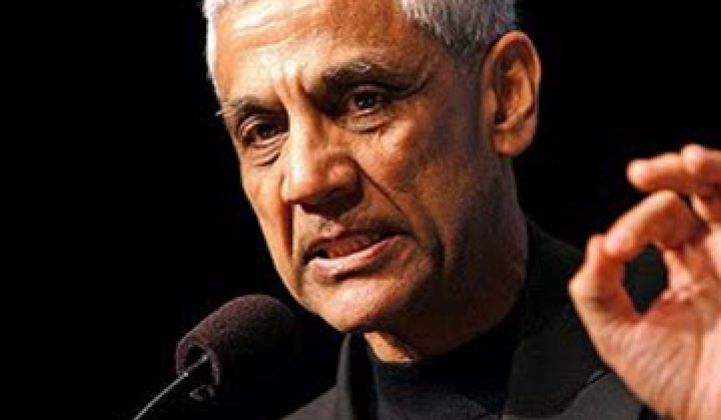Vinod Khosla, contrarian and controversial venture capitalist, spoke last week at the Berkeley-Stanford Cleantech Conference in a fireside chat with Stanford professor Ryan Orr. Khosla was his usual provocative self.
The conference was concerned with greentech in developing markets but Khosla's speech spanned a wider swath than that.
Khosla noted that after the dot-com crash, internet traffic growth remained unchanged. The internet didn't collapse -- the only thing that changed was stock prices, "which has nothing to do with the real world," according to Khosla, who concluded that, "cleantech is not what journalists value or what Wall Street values. The two are completely unrelated."
"Cleantech comes in and out of fashion," said Khosla, and it "will be OK if you can keep the environmentalists at bay." He added, "Cleantech has been hurt more by environmentalists than any other constituency."
Khosla contended that environmentalists "push all these idealized solutions that don't make any economic sense," adding, "Don't look at theoretical scenarios; look at what makes economic sense. Nothing defies the law of economic gravity. [...] I don't care how green it is if it does not work for the rest of the world." He went on to say, "Priuses sell well in Berkeley" but do not sell well in Mississippi, "and Mississippi is closer to the rest of the world than Berkeley."
Some more observations from Khosla on energy in developing nations:
- "Battery storage makes more sense in India" than in the U.S. It's much easier to compete with diesel power than to compete against a coal plant.
- LED lighting has a fast six-month payback time in a retail setting in India.
- "Wind doesn't make sense unless you attach storage to it." (Editor's note: Huh?)
- "We need to find a way to lower the cost of capital."
- Energy startups should focus on the 'Chindia' price.
- There is lots of opportunity in developing economies "where you don't have enough grid."
The investor spoke of a few of his cleantech portfolio firms and their exposure to emerging markets.
According to Khosla, LanzaTech takes flue gases from steel mills' exhaust and converts the flue gas to butanol, ethanol, or propanol. The steel mills working with LanzaTech such as China's Hebei or Baosteel are in the emerging world. Khosla called it a "perfect project" in taking a waste stream and transforming it into something useful. He said that it "could turn more profit from the steel mill than the steel itself."
The company uses a proprietary microbe that consumes carbon monoxide and emits ethanol without using water or land resources, according to Prabhakar Nair, VP of business development in Asia for LanzaTech. The company recently raised $55.8 million in a Round C of financing, which will be used to scale up. LanzaTech currently has a pilot mill in New Zealand, where the company is headquartered, and is opening a pre-commercial scale plant for Baosteel this year.
The goal at Kior is to replace every one of the hundreds of shuttered paper mills in this country with a Kior factory converting wood chips to fuel. This firm is starting its operations in Mississippi and selling its fuel directly to FedEx and Chevron. Khosla claims that the firm will compete with unsubsidized $100-per-barrel oil.
Khosla's other portfolio firm, PSP (formerly Point Source Power) of Alameda, California, looks to provide a low-cost solid oxide fuel cell powered by the heat of a cook stove and a charcoal or dung fuel. The electricity produced by the fuel cell could charge a cell battery or power an LED light. The first market is Kenya.
Asked "How can governments replicate Silicon Valley?" Vinod suggested that government "Stay out of our way." He added, "I've not seen a single project done well by any NGO in the cleantech area," adding, "I'd guess that half of the money goes to consultants. I'd consider most of that money wasted."
Khosla dismissed the McKinsey & Company consulting firm as producing "content-free buzzword-compliant reports" and the Hewlett and Rockefeller foundations as "highly wasteful organizations." He suggested that wanting to do good is not the same as doing good. Doing good is about being hard-nosed and making tough decisions.
Back to environmentalists: "The environmentalists have done a good job of flagging the key questions, [but] when they start pushing solutions, environmentalists do poorly."
***
Articles by and about Vinod Khosla:



